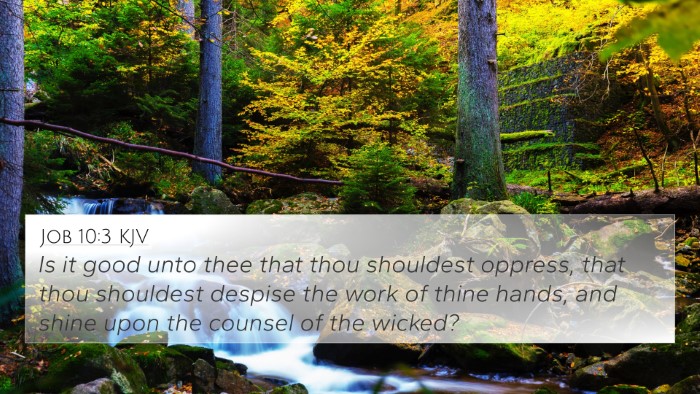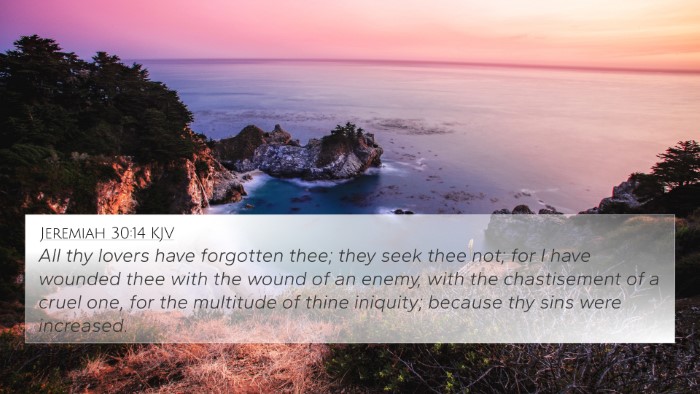Understanding Job 30:21
Job 30:21 states: "You turn on me ruthlessly; with the might of your hand you attack me." In this verse, Job is expressing deep anguish and feelings of betrayal. He feels that God has become his adversary, a theme prevalent throughout the Book of Job. The interpretation of this verse unveils layers of theological and emotional complexities that resonate with the human experience of suffering and divine silence.
Commentary Insights
Insights from esteemed biblical commentators provide a deeper understanding of the emotional and spiritual dimensions of this verse:
- Matthew Henry: Henry emphasizes the contrast between Job's past blessings and his current suffering. He suggests that Job's feelings of abandonment by God are intensified by his understanding of God's previous kindness. The verse reflects the tragic irony of a faithful servant experiencing the apparent withdrawal of his divine benefactor.
- Albert Barnes: Barnes interprets this verse as Job’s expression of despair and the perception of being targeted by God. He highlights the intensity of Job's feelings, portraying a struggle between faith and the harsh reality of his circumstances. Job's cry underscores the human plight of seeking God when faced with suffering.
- Adam Clarke: Clarke notes that this verse indicates Job’s sense of injustice. He perceives God's actions as hostile rather than merciful. Clarke elaborates on the psychological turmoil Job faces, which is reflective of a broader inquiry into the nature of divine retribution and human suffering.
Bible Verse Cross-References
Job 30:21 is interconnected with several other biblical texts, enhancing its meaning through cross-references. Below are key related verses:
- Psalm 22:1: "My God, my God, why have you forsaken me?" - A cry of abandonment that echoes Job's feelings.
- Psalm 13:1-2: "How long, O Lord? Will you forget me forever?" - This Psalm resonates with Job's question of divine silence.
- Isaiah 54:8: "In overflowing anger for a moment I hid my face from you..." - Reflects God's temporary hiding of His face from His people.
- Matthew 27:46: "My God, my God, why have you forsaken me?" - Jesus' words on the cross echo Job's lament.
- Habakkuk 1:13: "Your eyes are too pure to look on evil; you cannot tolerate wrong..." - Habakkuk expresses a similar frustration with God's seeming inactivity against evil.
- 2 Corinthians 12:9: "My grace is sufficient for you, for my power is made perfect in weakness..." - Provides a New Testament perspective on suffering and strength.
- Romans 8:28: "And we know that in all things God works for the good of those who love him..." - Offers hope in the midst of suffering.
Thematic Considerations
Job 30:21 delves into themes of suffering, abandonment, and the search for justice. Understanding this verse within a broader thematic context reveals insights into the nature of suffering and faith. This thematic connection can guide readers through the complexities of faith during trials:
- The Suffering Servant: Job embodies the archetype of the suffering servant, reflecting human anguish amidst perceived divine neglect.
- The Silence of God: The feeling of divine silence is a recurring theme in both the Old and New Testaments, paralleling with Psalms and the Gospels.
- Faith Under Duress: The continuous struggle to maintain faith during times of severe trial connects to various Biblical figures, such as Jesus and the prophets.
Cross-Referencing Biblical Texts: Tools and Methods
For those studying the connections between Bible verses, employing a cross-reference system can enhance comprehension and facilitate deeper theological exploration:
- Bible Concordance: Utilize a concordance to find original language meanings and cross-references.
- Bible Cross-Reference Guide: These guides help locate related scriptures to develop a comprehensive understanding.
- Cross-Reference Bible Study: Engaging in structured Bible study sessions that examine related passages for cohesive understanding.
- Identifying Connections: Delve into how different scriptures relate thematically and contextually across the Old and New Testaments.
Conclusion
Job 30:21 serves as a poignant illustration of humanity's struggle with suffering and the quest for divine presence. The insights from various public domain commentaries highlight the depths of Job's despair while also encouraging reflection on the broader biblical context. By utilizing cross-referencing techniques and studying the interconnectedness of scriptures, readers can gain a richer understanding of this verse and its implications for faith amidst suffering.















